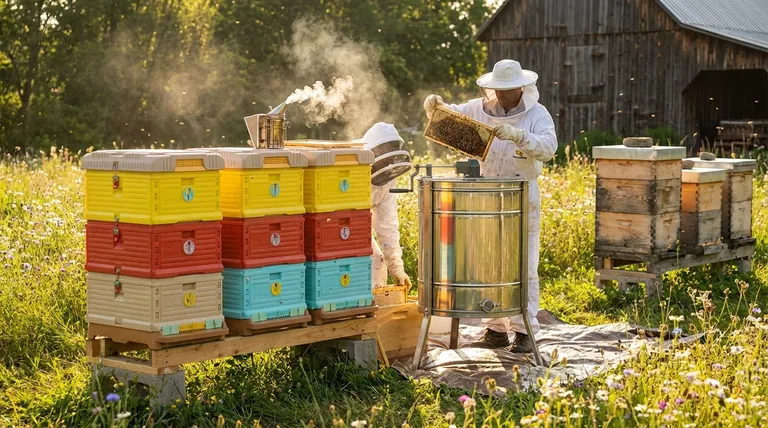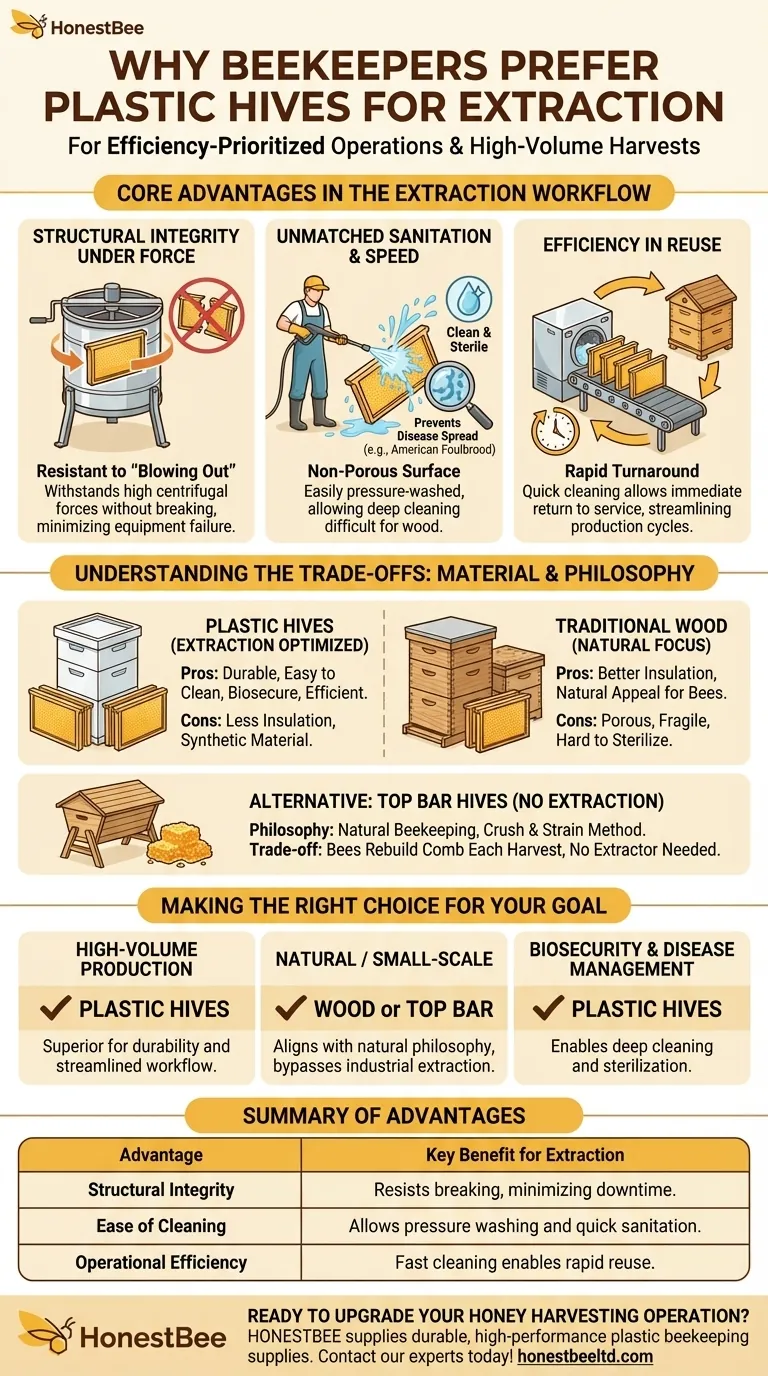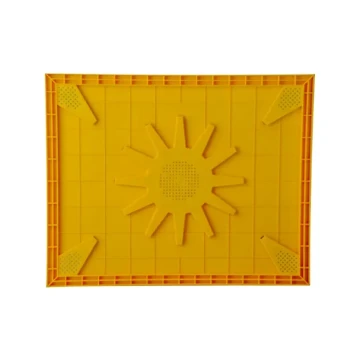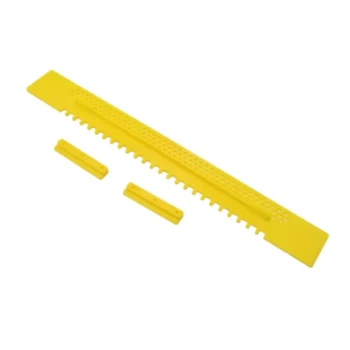For beekeepers prioritizing efficiency, plastic hives present clear advantages during honey extraction due to their exceptional durability and ease of cleaning. Unlike traditional wooden components that can be fragile, plastic frames and boxes are engineered to withstand the high rotational forces of a centrifugal extractor. This resilience, combined with a non-porous surface, dramatically simplifies the post-harvest cleaning process.
The decision between plastic and other hive materials hinges on a fundamental trade-off between operational efficiency and beekeeping philosophy. Plastic excels in the demanding, high-volume environment of extraction, while wood and alternative hive designs appeal to those prioritizing natural materials and less-industrialized methods.

The Core Advantages in the Extraction Workflow
The preference for plastic is not arbitrary; it is rooted in tangible benefits that directly impact the speed, safety, and scalability of the honey harvesting process.
Structural Integrity Under Force
A centrifugal extractor spins frames at high speed to force the honey out of the comb. This process puts immense stress on the frame's structure.
Plastic frames, often molded as a single piece, are exceptionally resistant to "blowing out" or breaking apart under this force. This durability minimizes equipment failure, lost honey, and the time-consuming task of repairing broken wooden frames mid-extraction.
Unmatched Sanitation and Speed
After extraction, frames are sticky with residual honey and wax. Ease of cleaning is a major operational concern.
The non-porous surface of plastic makes it simple to scrape clean. More importantly, plastic components can be cleaned with a pressure washer, a method that would severely damage or destroy wooden equivalents. This allows for a level of sanitation that is critical for preventing the spread of diseases like American Foulbrood between colonies.
Efficiency in Reuse
The combination of durability and rapid cleaning means plastic equipment can be returned to service almost immediately.
For a beekeeper managing many hives, this quick turnaround is a significant advantage, reducing the total amount of equipment needed and streamlining the entire honey production cycle.
Understanding the Trade-offs
While plastic offers clear benefits for extraction, it is not the superior choice for every beekeeper or every goal. Acknowledging the alternatives provides a more complete picture.
Plastic vs. Wood: The Classic Debate
Wood is the traditional material for beekeeping. It offers better insulation against cold and heat, and many beekeepers feel the bees are more inclined to build and work on a natural material.
However, wood is porous. It can absorb moisture, warp over time, and potentially harbor disease spores that are difficult to eradicate. Its components, held together by nails and glue, are inherently more fragile in an extractor.
Why Some Hives Bypass Extraction Entirely
Hive designs like the Top Bar hive operate on a completely different principle. Honey is not extracted from reusable frames but is harvested by cutting the comb from the top bar and then crushing and straining it.
This method requires no expensive extractor and is favored by hobbyists focused on natural beekeeping, as it avoids the industrial process of centrifugation. The trade-off is that the bees must rebuild all the wax comb after each harvest, which requires significant energy and resources.
Making the Right Choice for Your Goal
Your beekeeping goals should dictate your choice of equipment. Consider what you are trying to optimize for.
- If your primary focus is high-volume production and efficiency: Plastic's durability in the extractor and its unparalleled ease of cleaning make it the superior choice for a streamlined workflow.
- If your primary focus is natural beekeeping or small-scale hobbyism: Traditional wooden Langstroth hives or alternative designs like the Top Bar hive may align better with your philosophy and negate the need for industrial-style extraction.
- If your primary focus is biosecurity and disease management: The non-porous nature of plastic allows for a level of deep cleaning and sterilization that is very difficult to achieve with porous wood.
Ultimately, understanding these material differences empowers you to select the equipment that best serves your specific operational needs and beekeeping philosophy.
Summary Table:
| Advantage | Key Benefit for Extraction |
|---|---|
| Structural Integrity | Resists breaking in centrifugal extractors, minimizing downtime. |
| Ease of Cleaning | Non-porous surface allows for pressure washing and quick sanitation. |
| Operational Efficiency | Fast cleaning enables rapid reuse, streamlining high-volume harvests. |
Ready to upgrade your honey harvesting operation? For commercial apiaries and distributors, the right equipment is key to maximizing yield and maintaining biosecurity. HONESTBEE supplies durable, high-performance plastic beekeeping supplies designed to withstand the rigors of commercial extraction. Contact our wholesale experts today to discuss how our equipment can enhance your efficiency and protect your colonies.
Visual Guide

Related Products
- Professional Insulated Plastic Bee Hives
- HONESTBEE Professional Long Handled Hive Tool with Precision Cutting Blade
- Plastic Transporting Bee Packages and Nuc Boxes for Beekeeping
- Australian Langstroth Beehive Boxes for Beekeeping Wholesales
- Portable Bee Mating Hive Boxes Mini Mating Nucs 8 Frames for Queen Rearing
People Also Ask
- Why is it necessary to ensure a slight forward tilt when installing a beehive? Best Practices for Hive Drainage
- Is polystyrene better than wood beehives? A Modern Choice for Healthier Bees & Easier Management
- What is the purpose of a bee box? A Complete Guide to Modern Hive Management
- Why is it recommended to buy at least two bee hives? Boost Your Success with a Second Colony
- How does the orientation of the hive sides benefit comb construction? Ensure Straight, Movable Combs for Easier Hive Management



















